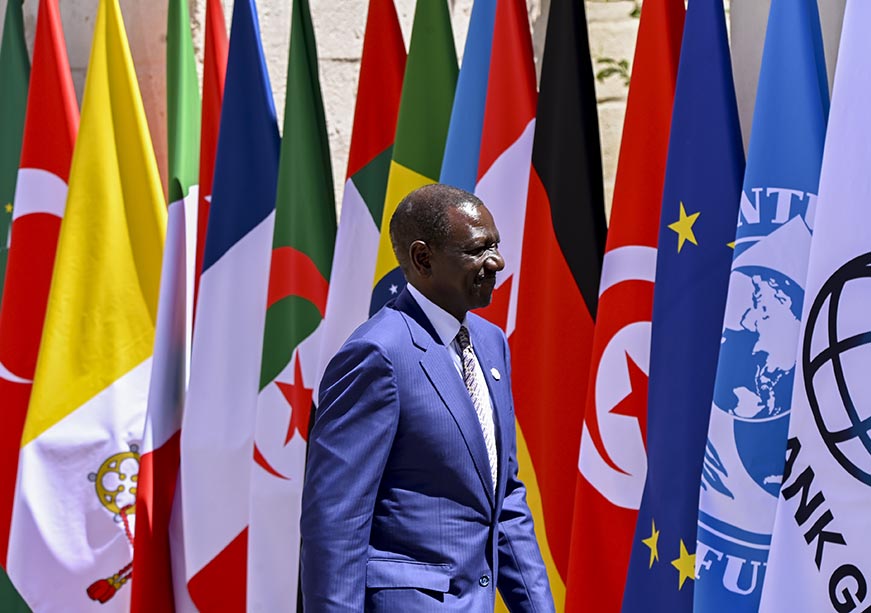-
CENTRES
Progammes & Centres
Location
While the G7's engagement with Africa signals a positive shift, the latter must navigate these developments cautiously, given the growing great power dynamics

Image Source: Getty
On 13 June, the G7 countries met in Apulia, Italy. In addition to the seven leaders, the Summit was also attended by the leaders of India, Indonesia, and Argentina. Leaders from Algeria, Kenya, Mauritania, and Tunisia, along with Moussa Faki Mahamat, the current chair of the African Union Commission, were invited to represent Africa at the Summit. As the world is currently witnessing two metastasising wars in Ukraine and Gaza, unsurprisingly, the economic implications of these wars topped this year’s agenda. However, as matters related to Africa took centre stage, it reflected Africa’s growing salience for the G7.
Yet, the Africa focus of G7 is not a surprise. Earlier this year, on 20 March, Italy hosted a G7 meeting on Africa. During that meeting, Italy enunciated five priority areas of Italy-Africa cooperation: education and training, health, agriculture, water, and energy. Undoubtedly, during the G7 Summit in Apulia, energy security hogged the limelight, particularly in the backdrop of the ongoing Russia-Ukraine war-induced energy crisis. Indeed, the war has shifted Europe’s focus to Africa, a resource-rich continent with the potential to be developed as an alternative source of global energy.
During the G7 Summit in Apulia, energy security hogged the limelight, particularly in the backdrop of the ongoing Russia-Ukraine war-induced energy crisis
In January 2024, Italy also hosted the first Italy-Africa Summit, joining nations such as Japan, China, India, the US, Russia, and Turkiye to host an Africa+1 summit. Early this year, Saudi Arabia and South Korea also hosted their first Africa Summit. Indeed, the way both traditional and non-traditional powers are courting Africa, it appears that finally the time of ‘Africa rising’ has arrived.
In addition to these bilateral forums, the importance of Africa is acknowledged in different multilateral forums. Last year, the African Union was included in G20 as a permanent member. In the BRICS Summit 2023, two African nations, Egypt and Ethiopia, were included as permanent BRICS members. This year, Africa also leads a few multilateral forums, such as Uganda hosting the Group of 77 and China and the Non-Aligned Movement. However, when Africa-related issues take centre stage even in the G7, it becomes imperative to assess the discussions and outcomes of the G7 Summit from an African perspective.
During the G7 Summit, a broad consensus was reached accepting the centrality of Africa in tackling challenges, including food and energy security, countering climate change, connectivity, and migration. During the Italy-Africa conference, Italy committed several energy-related investments in Africa, which included the development of a biofuel supply chain in Kenya, ELMED electricity interconnection between Italy and Tunisia, or the new H2 South Corridor to transport hydrogen from North Africa to central Europe, passing through Italy. Clearly, Italy aimed to convince G7 leaders to support these projects, ultimately contributing to European energy security.
The expansion of PGII to include Africa was also a key agenda item for Italy as the G7 President since the G7 would now also support Italy’s Mattei Plan for investing in Africa.
Towards this goal, the key policy outcome remained the advancement of the Partnership for Global Infrastructure and Investment (PGII), the G7’s flagship financing initiative competing with China’s Belt and Road Initiative, to Africa. PGII’s financing for the continent would fill Africa’s investment gap in energy- and climate-friendly infrastructure. The expansion of PGII to include Africa was also a key agenda item for Italy as the G7 President since the G7 would now also support Italy’s Mattei Plan for investing in Africa.
Further, the role of the G7’s PGII in Africa’s development is a strategic manoeuvre as it is touted to work towards providing African nations with an alternative developmental partner to China. However, China’s BRI has focussed more on hard infrastructure projects like railways, ports, dams, etc., while the PGII’s focus has been on softer outcomes like climate and health. In the recent summit, leadership unanimity was seen to expand the PGII’s ambit to include connectivity projects like Africa’s Lobito Corridor and begin financial coordination for infrastructure development.
Addressing Africa’s energy security, the G7 launched the Energy for Growth in Africa initiative, which will initially collaborate with the Republic of Congo, Côte d’Ivoire, Ethiopia, Kenya, Mozambique, Nigeria, and South Africa. Partnering with the UNDP, the G7’s initiative aims to inject more concessionary finance to develop energy infrastructure in Africa. This push by the G7 is a positive development for Africa as the cost of financing energy projects in the continent is high due to perceived risks faced by the lenders.
G7’s push for development in Africa also falls under similar strategic choices that help curb migration into Europe.
Another key issue on the agenda was migration, especially from Africa into Europe. The G7 leadership vouched to address the root causes, the so-called push factors that force people to migrate from Africa. This made Africa’s need for increasing employment and fighting against climate vulnerability and security issues a collective strategic need of the G7 states. However, it also means that the Western interests in Africa remain derivative of their own needs to curb migration, climate change, and energy insecurity. G7 countries are also concerned about the effects of AI on employment in Africa, which leads to higher migration. G7’s push for development in Africa also falls under similar strategic choices that help curb migration into Europe.
During the side events at the Summit, the Italian PM met with the President of the African Development Bank (ADB) Group to operationalise the Mattei Plan and Italy’s own Africa outreach. The ADB would be the strategic African financial partner, collaborating with Italy to implement the Mattei Plan. In line with the private financing preference of the G7, Italy also announced a Growth and Resilience platform for Africa (GRAf), which will facilitate private investments to support entrepreneurial activities leading to job creation in Africa. In another side event at the Summit, Italy also declared its support for contributions of up to US$320 million in investment to support the core rail infrastructure in Africa’s Lobito Corridor.
Although not by design, the African issues have been prioritised in all recent multilateral meetings. As the G7 Summit’s outreach agenda foregrounded Africa as a crucial player in the G7’s global strategy, it underscores the importance of Africa for the rest of the world. Indeed, this welcome rise of Africa has many reasons to cheer, especially as leaders of the world’s seven advanced economies have pledged economic support for Africa. This evolution is also crucial for Africa, which remains relatively marginal in economic, military, and diplomatic terms. However, Africa must tread these developments with caution as much of these commitments would depend on the political developments in the G7 countries, specifically the US, and the outcome of Russia’s war with Ukraine.
As the G7 Summit’s outreach agenda foregrounded Africa as a crucial player in the G7’s global strategy, it underscores the importance of Africa for the rest of the world.
Today, African governments face many challenges, from food security to climate change and terrorism. The impact of war in Ukraine has also been severe on the continent. Amidst this escalating tension between the West, Russia and China, the last thing Africa would want is to get embroiled in the war. Therefore, it is time for African leaders to show their agency and avoid taking sides. Indeed, as the future of Africa is intertwined with global growth, It is also a recognition of the more profound interdependence between the North and South. That fact alone makes Africa’s importance in this year’s G7 a reason to celebrate.
Samir Bhattacharya is an Associate Fellow at the Observer Research Foundation.
Angad Brar Singh is a Research Assistant with the Strategic Studies Programme at the Observer Research Foundation.
The views expressed above belong to the author(s). ORF research and analyses now available on Telegram! Click here to access our curated content — blogs, longforms and interviews.

Samir Bhattacharya is an Associate Fellow at ORF where he works on geopolitics with particular reference to Africa in the changing global order. He has a ...
Read More +
Angad Singh Brar was a Research Assistant at Observer Research Foundation, New Delhi. His research focuses on issues of global governance, multilateralism, India’s engagement of ...
Read More +